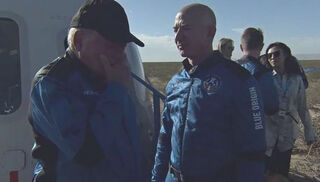Media
How William Shatner Became an Astronaut at 90
Captain Kirk is still helping us imagine the possibilities of space travel.
Posted October 13, 2021 Reviewed by Ekua Hagan
There are some people who have a special talent for igniting our collective imagination. William Shatner is one. Today he went into space and came back to tell the tale of his adventure.
Perspective
Blue Origin, founded by Jeff Bezos, sent Shatner and three other people on a rocket ship into space. To put this in perspective, there are 7.8 billion people currently alive on planet Earth. It is estimated that the total number of people who have ever lived is about 120 billion (1). Of those, about 600 have been traveled into space. On top of that, William Shatner, at age 90, is now the oldest human being to ever travel into space.
Our Voyages With Shatner
Shatner has been a public personality for seven decades, give or take a few years. The world knows him, of course, as Captain Kirk from Star Trek. As Kirk, he and his crew boldly went where no one had gone before, pushing the envelope of human space exploration, of science and discovery.
You could easily make fun of the idea that Shatner’s myriad fans are caught in a collective delusion, thinking that Captain Kirk is used to space travel. In truth, we know that Shatner boldly went to the Paramount soundstage, not into space. His aliens were actors in costume. And yet, if we stop there, we’re missing so much of the point of who we are as people and of what shared experiences mean to us.
Actors and writers work together to tell stories about possible futures. When they do that, they are helping the rest of us imagine what is possible as well as what we might aspire to. What Shatner did on Star Trek was precisely this: He helped us imagine a more diverse and boldly successful future. The Star Trek vision of the future is cherished by fans as one that is strong and healthy. In that vision, we’ve found a way to become one of the best versions of ourselves that we can imagine.
The High Value of Demonstrating Possibility
As a social psychologist who studies the media’s role in our lives, I encourage you not to think of our interest in William Shatner as a misguided delusion. Rather, think of him as a talent who is uniquely qualified to do a specific job: the demonstration of possibility.
The Perspective of Space
Captain Kirk and his crew ignited our collective imaginations by demonstrating what was possible in the future of space travel. Today, this man who we have known as Captain Kirk went into space. When he landed, he came out of the space capsule and spoke with Jeff Bezos about his experience.
As a listener, I was struck by how wonderfully William Shatner articulated what he learned on his space flight. As he spoke, his eyes often had tears in them. Shatner had discovered something unexpected when he crossed from the atmosphere into space. He described flying at lightning speed through the blue sky that was like a soft, comfortable blanket, only to be thrust into the blackness of space. Space, he said, seemed like death whereas the blue sky seemed like life.
He was struck by how thin the atmosphere is — how close the line between life and death. He’s right. On the ground, our perspective is often that the sky is unlimited and eternal. For the roughly 600 people who have broken through the atmosphere, they know from their own experience that the atmosphere is thin. One of the goals of Blue Origin is to explore possibilities for cleaning the Earth, thus protecting that thin atmosphere.
I was moved by Shatner’s comments. As a fan, I was proud of him for being 90 years old and being physically able to make it into space. I was also proud of how beautifully he articulated what the journey from Earth to space and back meant to him.

As mentioned above, some people have a talent for igniting the imagination — for demonstrating what is possible, and for helping others imagine those possibilities. Also, when you spend decades as a fan of an artist like William Shatner, it makes the experience of witnessing their journey that much more personal and meaningful.
So, thank you, Captain Kirk. And thank you, William Shatner, for boldly going into space at age 90, and for helping us understand what you saw out there. In doing so, you help us visualize and aspire to a better future.




